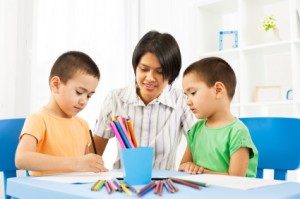Have you just started homeschooling your children? Are you just beginning to think of pulling them out of traditional school? If so, it’s time to untangle some of the specialized educational jargon associated with schooling at home. Words and phrases such as multiple intelligences, Montessori, accreditation, scope and sequence, and eclectic learning sound like another language. One of the most recent and faddish terms in the realm of homeschooling is deschooling. Without reading any further, you can probably get some sense of what this term means, but let’s dive in a little deeper.
What Is Deschooling?
 The word “deschooling” became popular thanks to a book called Deschooling Society, written by Ivan Illich in 1971. The Austrian philosopher and social critic wrote this radical book as a criticism of institutionalized education and to advocate learning by self-direction. While Illich’s use of the term deschooling is radical and revolutionary, for a homeschooler, the meaning is a little less severe.
The word “deschooling” became popular thanks to a book called Deschooling Society, written by Ivan Illich in 1971. The Austrian philosopher and social critic wrote this radical book as a criticism of institutionalized education and to advocate learning by self-direction. While Illich’s use of the term deschooling is radical and revolutionary, for a homeschooler, the meaning is a little less severe.
For a homeschooler, deschooling means giving your children a period of time in which to loosen and lose the shackles of traditional schooling. Depending on how long your children have been in school, their attachment to highly scheduled blocks of time, structured education, and a strict grading system may be strong or weak. Deschooling means allowing or, if needed, helping your children learn to love learning again and to remember how to be curious and creative without the constraints of school.
Traditional schools are very good at taking all the joy out of learning. Even if you intend to retain some of the traditional structure in your homeschooling environment, by its very nature, teaching at home is less rigid and more focused on the pleasures of learning and growing. The transition from school to home without a period of decompression is thought by some to be shocking and difficult.
Is Deschooling The Same As Unschooling?
There is no official dictionary for these terms, so there is often confusion on this point. Some people use the terms deschooling and unschooling to mean the same thing. To further complicate the situation, there are two different meanings. Some refer to the decompression period between traditional and home schooling as both deschooling and unschooling. Others use both terms to describe a philosophy of education.
Unschooling is a philosophy used by some homeschoolers that resembles the period of deschooling, but extends it throughout a child’s entire education. In other words, a homeschooler that practices unschooling rejects in its entirety the constraints and traditions of a typical school. The unschooled child learns in a self-directed manner and is not graded by a letter scale. He probably does not take tests either.
Is Deschooling Necessary?
Whether deschooling is a necessary transitional step between traditional school and homeschooling is up for debate. The best answer is that it certainly can’t hurt and may be a very positive way to make the transition. Whether you intend to stick with the rigidity of a traditional school, you mean to embrace unschooling wholeheartedly, or you want to incorporate elements of each style of learning into your homeschool, a period of decompression can be beneficial, not to mention fun.
A period of deschooling becomes more important the longer your children have been in school. If you are moving your first grader and fifth grader out of school and into your home for education, the first grader is likely to make a smoother transition. Your fifth grader will find it more of a disruption to change from the rules of school to the home environment. Deschooling may be more important for her. How necessary a period of transition is depends very much on the individual. No one knows your child better than you and the child herself, so together you can decide on if and for how long she needs to relax and rediscover the joy of learning.
How Long Should Deschooling Last?
If you do choose to set aside some time for deschooling, you need to consider the length of time. Of course you don’t want to waste time and let your child fall far behind, but on the other hand, you need to remember that there are no strict guidelines and time frames anymore. You and your children have the freedom to teach and to learn at your own chosen pace.
That being said, one general guideline is that deschooling should last one month for every year that your child was in traditional school. This means that your first grader would take one month to decompress and your fifth grader, five months. This can sound daunting, but it is only a general rule. You get to decide how much time is worthwhile for your children and does not hamper their progress.
How Can I Deschool My Kids?
Deschooling does not mean letting your child sit in front of the television for hours each day “relaxing.” Your children should be learning during this time, but in a completely unstructured and self-directed manner. This means that your child gets to choose what to do each day, within reason and with some guidelines. If your child wants to watch TV and can’t come up with any better ideas for what to do, provide him with options and let him choose from among them. Here are some ideas to get you started:
- Go to the library. One of the first things that gets squashed or never is allowed to flower in the first place while a child is in school is the love of reading. Give her free reign at the library to choose books to read and let her learn to love it. Your library can also offer much more than just books to check out. Check with the librarians to find out what types of activities they provide for children. This may include story time, reading to a dog, crafting classes, or putting on plays.
- Get artsy and craftsy. Art is a great way to stimulate creativity and curiosity. Give your children the freedom to use whatever supplies they want and to make whatever they feel like. If they have trouble getting started, give them ideas and options. Or, start with more structured craft projects and encourage them to then get into more pure forms of art like drawing or painting.
- Take field trips. With the burden of budget cuts and standardized tests, field trips have all but disappeared from public and even private school curricula. Now is a great time to take the kids out to places in your community that will be both fun and educational. This could mean going to an art museum, a nature center, a planetarium, or a local park with ranger-guided walks. Resist the urge to structure the visit or to ask your children to recite what they learned. Instead, start an informal conversation on the way home about your favorite part of the day.
- Enjoy the great outdoors. One of the great tragedies of traditional schooling is the fact that children are penned up indoors with only very minimal time outside. Too often that small amount of time outside is structured. Children benefit greatly from being out in nature and from playing without restrictions or guidelines. Have an outside-only day where everyone stays outside from breakfast to dinner. Bring a cooler of food and drinks, plenty of books to read, and art supplies, but leave all electronics inside. Don’t forget sunscreen!
Do I Need To Deschool Too?
Unequivocally, yes. Even if you have been dreaming of homeschooling for years or planning it for months, you have still been institutionalized by having been in school yourself and by experiencing school again through your children. It may be just as tough for you, if not even more challenging, to through off the shackles of scheduling every minute of the day, of grading on a letter scale, of assessing knowledge through standardized tests, and of feeling the pressure to race through topics the way a traditional school does.
If you spend time deschooling with your children, you will probably find that you have to stop yourself often from turning this time into structured education. As you deschool, you will learn to relax and to teach the way your children want to learn: with curiosity and with love.
©2012 Off the Grid News
 Off The Grid News Better Ideas For Off The Grid Living
Off The Grid News Better Ideas For Off The Grid Living



